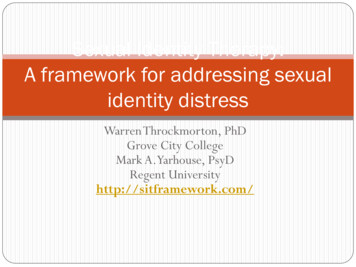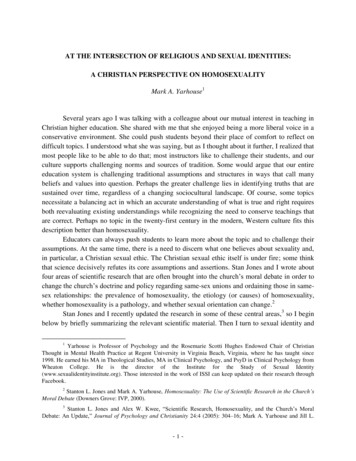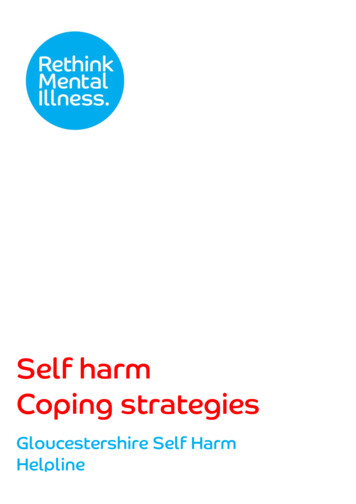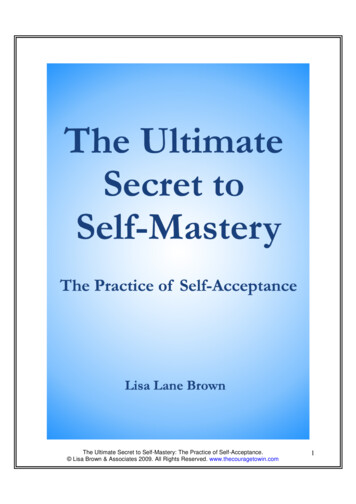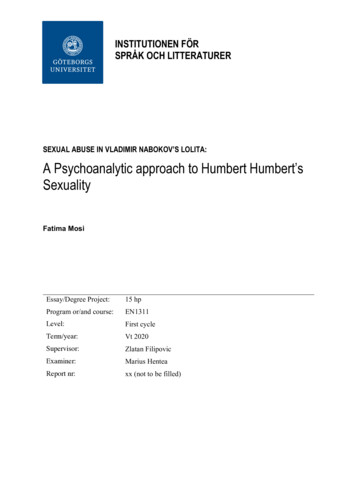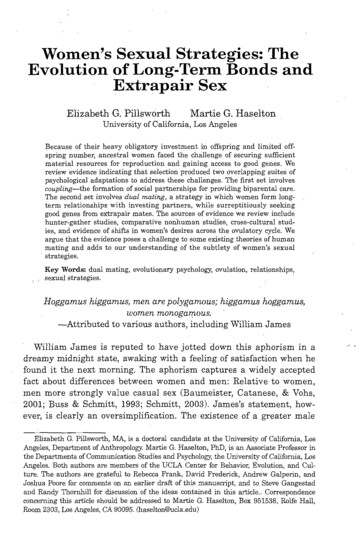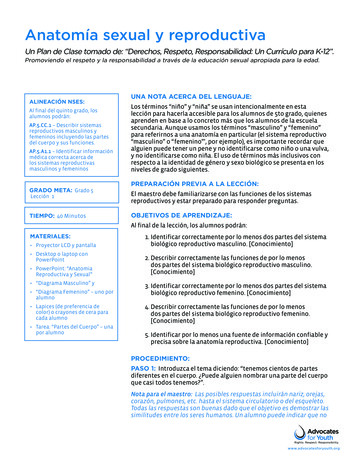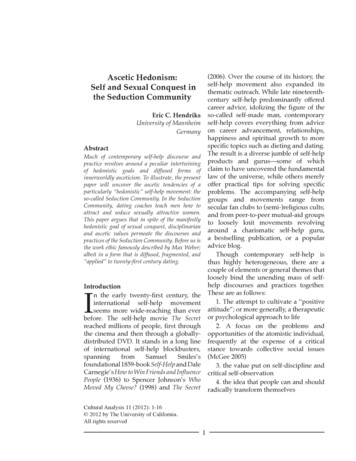
Transcription
Ascetic HedonismAscetic Hedonism:Self and Sexual Conquest inthe Seduction Community(2006). Over the course of its history, theself-help movement also expanded itsthematic outreach. While late nineteenthcentury self-help predominantly offeredcareer advice, idolizing the figure of theso-called self-made man, contemporaryself-help covers everything from adviceon career advancement, relationships,happiness and spiritual growth to morespecific topics such as dieting and dating.The result is a diverse jumble of self-helpproducts and gurus—some of whichclaim to have uncovered the fundamentallaw of the universe, while others merelyoffer practical tips for solving specificproblems. The accompanying self-helpgroups and movements range fromsecular fan clubs to (semi-)religious cults;and from peer-to-peer mutual-aid groupsto loosely knit movements revolvingaround a charismatic self-help guru,a bestselling publication, or a popularadvice blog.Though contemporary self-help isthus highly heterogeneous, there are acouple of elements or general themes thatloosely bind the unending mass of selfhelp discourses and practices together.These are as follows:1. The attempt to cultivate a “positiveattitude”; or more generally, a therapeuticor psychological approach to life2. A focus on the problems andopportunities of the atomistic individual,frequently at the expense of a criticalstance towards collective social issues(McGee 2005)3. the value put on self-discipline andcritical self-observation4. the idea that people can and shouldradically transform themselvesEric C. HendriksUniversity of MannheimGermanyAbstractMuch of contemporary self-help discourse andpractice revolves around a peculiar intertwiningof hedonistic goals and diffused forms ofinnerworldly asceticism. To illustrate, the presentpaper will uncover the ascetic tendencies of aparticularly “hedonistic” self-help movement: theso-called Seduction Community. In the SeductionCommunity, dating coaches teach men how toattract and seduce sexually attractive women.This paper argues that in spite of the manifestlyhedonistic goal of sexual conquest, disciplinarianand ascetic values permeate the discourses andpractices of the Seduction Community. Before us isthe work ethic famously described by Max Weber;albeit in a form that is diffused, fragmented, and“applied” to twenty-first century dating.IIntroductionn the early twenty-first century, theinternational self-help movementseems more wide-reaching than everbefore. The self-help movie The Secretreached millions of people, first throughthe cinema and then through a globallydistributed DVD. It stands in a long lineof international self-help nal 1859-book Self-Help and DaleCarnegie’s How to Win Friends and InfluencePeople (1936) to Spencer Johnson’s WhoMoved My Cheese? (1998) and The SecretCultural Analysis 11 (2012): 1-16 2012 by The University of California.All rights reserved1
Eric C. HendriksThat last point—the belief in selftransformation—in fact constitutes thefundamental premise of all self-helpteachings and is that at which all selfhelp practices are ultimately aimed. Youhelp yourself by transforming yourselfinto something better: a more sociallyskilled, spiritually enriched, financiallysuccessful, or sexually satisfied person.Self-help books, DVDs, and trainingprograms promise to assist theirreaders, viewers and clients in effectinga transformation of the self; and theyusually suggest—at least initially, on themarketing level—that this transformationwillbe spectacular, extensive andrelatively abrupt.In recent years, there has been anincreased scholarly interest in self-helpnarratives and teachings, as well as intheir broader social and cultural impact.Recent works on the topic include SandraDolby’s folkloristic study Self-Help Books,Micki McGee’s critical analysis Self-Help,Inc. and Eva Illouz’s broader sociologicalresearch Saving the Modern Soul: Therapy,Emotions, and the Culture of Self-Help. Whatthese researches show is that self-helpnarratives and teachings not only help, orfail to help, individual self-helpers withtackling specific (perceived) personalchallenges, but that they also encourageself-helpers to adopt a particular way ofdescribing and perceiving their social lifeand overall identity. As Eva Illouz pointsout, the importance of self-help literatureis its role “in providing a vocabulary forthe self and in guiding the perceptions ofone’s social relations ” (Illouz 2008, 53)The basic idea here is that self-helpcan and frequently does change peopleand social groups by altering the waythey view themselves, society, and theirplace within it. Self-help can thus exerta socio-cultural influence irrespectiveof whether or not it actually changespeople in the way it initially promisedthem; that is, irrespective of whether itactually helps self-helpers to becomehappy or successful. So, even if a certainself-help teaching or product is in factnot delivering on its promises—or if selfhelp in general simply “doesn’t work”or “doesn’t help,” as many public criticscontend—it is still valuable to study itsimpact on people’s social and culturalidentities.To that end, the present researchshows how self-help, in spite of itsoften inflated promises of a “quick-fix,”can cause people to adopt a new selfunderstanding and lifestyle that centerson an ideal of self-improvement throughself-discipline. Interestingly, in the caseof the most dedicated self-helpers, theinitial promise of (quick) results andthe real identity changes self-helpersundergo often come to intertwine in ahighly complex fashion. Along the roadto change, small groups of dedicatedself-helpers may partially or completelyreinterpret what it means to be “helped,”as they partly or completely distancethemselves from their initial searchfor quick fixes to particular personalchallenges and begin to see theirdisciplined quest for self-improvementas constituting a goal in itself. The resultis a curious interplay between hedonismand an ascetic focus on self-discipline: thehedonistic attainment of financial, social,erotic or romantic success no longerconstitutes the only envisioned endgoal, but rather become part of a largerattempt to reach a state of empowermentand excellence through an ascetic focuson self-discipline.2
Ascetic HedonismThis subtle interaction betweenthe secular ascetic practices and thehedonistic promises of modern selfhelp is central to one of self-help’s majorbranches: the Seduction Community.Although not representative of modernself-help as a whole, the SeductionCommunity, an international self-helpmovement in which men are taught howto attract and seduce women, sharesmuch of its conceptual terrain with otherself-help movements.In the Seduction Community, datingcoaches or seduction gurus teach theirall-male students conversation skills andbody language techniques, as well aspsychological strategies that are meant toproduce an inner state of self-confidence.The gurus furthermore advocatevalues, lifestyles and worldviews thatthey consider useful when it comes totransforming oneself into an enormouslyattractive and seductive individual: awomanizer, a “pickup artist,” a master ofthe “Venusian arts.”At first the Seduction Communityappears to be a purely hedonisticmovement in which all moralconsiderations are set aside. The directgoal seems quite clear: sexual intercoursewith a large number of attractive women.Equally clear is the commercial characterof the seduction community: the schoolsare companies, the gurus businessmen,the students consumers. However, thereis also a strong ascetic component tothe Seduction Community which hasremained hidden from view to outsiders,if not also to many insiders. In thisasceticism, the means take priority overthe end; the self-discipline needed tostrategically attract and seduce womentakes priority over the sex, or at leastforms an important end in addition tothe sex.In the Seduction Community, wefind a diffused, fragmented expressionof the work ethic described by Weber.This work ethic—instrumental to whatWeber calls “the spirit of capitalism”—is rooted in a secularized and innerworldly expression of asceticism. Thisascetic work ethic drives the hedonismof the Seduction Community and viceversa. Thus, rather than asceticism andhedonism being two opposed forceskeeping each other in check in themovement, they seem to strengthen eachother. The search for sexual enjoymentintertwines with the quest for selfperfection and empowerment throughself-discipline and voluntary suffering.The Seduction CommunityThere is a long history of advice literatureon seducing women, of which Ovid’spoem “The Art of Love” (Ars Amatoria)is perhaps the most artistic product. Thislonger history should not be equatedwith the Seduction Community. TheSeduction Community is a specific setof related schools in Western popularculture. These schools originally formedan underground movement in LosAngeles in the late nineties, but they thenrose to mainstream prominence in thefirst decade of the twenty-first centuryafter the publication of Neil Strauss’bestselling book The Game in 2005 and thereality television series The Pickup Artiston the American VH1 channel in 2007and 2008. What sets the dating schoolsof the Seduction Community apart istheir highly systematic approach todating and their largely shared technicalvocabulary—a kind of idiosyncraticcommunity “language.”3
Eric C. HendriksThe main contributors to thisvocabulary and the community’s bodyof dating knowledge are as follows:1. the neuro-linguistic programming(NLP) and hypnosis-based schoolrooted in Ross Jefferies’ Speed Seductionmethod2. The Mystery Method school builton Mystery’s somewhat mechanisticstep-by-step method3. The “natural game” or identityoriented school, represented by TylerDurden and other coaches connected tothe dating advice company Real SocialDynamicsBesides these larger schools and thedating advice companies associated withthem, there are all kinds of less distinctseduction schools and methods, manysmaller dating advice companies, and anumber of celebrated freelance datingcoaches such as Sasha Daygame, AsianPlayboy or Badboy.A distinctive feature of the communityis the use of special pseudonyms (e.g. RossJefferies, Mystery, Tyler Durden, SashaDaygame, Asian Playboy, Badboy). Mostgurus and students use a pseudonym:a special seduction nickname by whichthey are known within the SeductionCommunity. This signals both theirdetermination to become a new personand their wish to be part of an exciting“underground” movement; but often itis also simply a way to post on seductionwithout one’s real name being linkedto a controversial self-help movementon Internet search engines. However, asthe movement entered the mainstreammedia and subsequently became asteady source of income to a number oftop dating coaches linked to a handfulof larger dating advice companies, somedating coaches began to use their realnames again. For example, the prominentcoaches Jlaix and Tyler Durden once againbecame Jeff Allen and Owen Cook.Despite the dominance of a handfulof larger companies, the SeductionCommunity is not only organized aroundthe top-down dissemination of productsand teachings, but also by the horizontalsharing of dating knowledge betweennon-professionals. Horizontal exchangesbetween students are typically noncommercial in character and take placein special online discussion fora andin local student meetings in numerouscities worldwide. In these meetings,known as “lair meetings”, groups ofseduction students not only discusstopics pertaining to womanizing, butalso team up for approaching women—perfect strangers—in “the field”. You canfind seduction students roaming aroundin nightclubs and bars, on streets and inparks, from Los Angeles to Tokyo.The ideas and approaches propagatedby members of the Seduction Communityvary widely. Some gurus and schoolsencourage the use of “canned material”—that is, rehearsed, status-conveyingstories that are thrown into conversationsto make a strong impression—whereasothers advocate “natural game,” whichinvolves a more spontaneous way ofinteracting. Some put the emphasis onlearning specific strategies, whereasothers stress the value of enhancing one’spsychological strength or “inner game,”arguing that attractive behavior flowsnaturally from a state of self-confidenceand emotional stability.However, these disagreements do notrun deep enough to result in sectariandivisions; there is clearly one Seduction4
Ascetic HedonismCommunity. The movement developsits unitary identity, in part, through avocabulary that is to a great degree sharedand which produces common valuesand outlooks on life. Though each of theseduction schools attempts to distinguishitself by developing novel concepts andmetaphors, these merely overlaid ontothe movement’s larger shared vocabulary.Moreover, the students active in theSeduction Community are usually notcompletely loyal to any particular schoolbut, rather, mix different metaphors andconcepts in their communication withother students.Lair meeting discussions and Internetfora are dominated by a number ofwidespread terms and metaphors. Theseinclude terms such as: “set” (a group offriends in a social gathering), “approachanxiety” (fear of initiating conversationswith attractive women), “routine”(canned story for impressing women),“kino escalation” (the establishing ofphysical intimacy), “alpha male” (theattractive, high-status male), “socialproof” (a way of signaling high status),“frame” (based on Goffman’s theory ofdramaturgical social frames), “wingman”(one’s in-field assistant), “plowing”(the act of slowly breaking through awoman’s standoffishness), “field report”(an online report on events in the field),“shit test” or “congruence test” (aprovocation by means of which a womantests a man’s strength and authenticity),“sarging” (going to social gatheringswith the purpose of seducing women),and “game.”Of these terms and metap
(NLP) and hypnosis-based school rooted in Ross Jefferies’ Speed Seduction method 2. The Mystery Method school built on Mystery’s somewhat mechanistic step-by-step method 3. The “natural game” or identity-oriented school, represented by Tyler Durden and other coaches connected to the dating advice company Real Social Dynamics Besides these larger schools and the dating advice companies .
